2020年春人教新目标英语八年级下册第三单元教案
- 格式:doc
- 大小:38.00 KB
- 文档页数:4
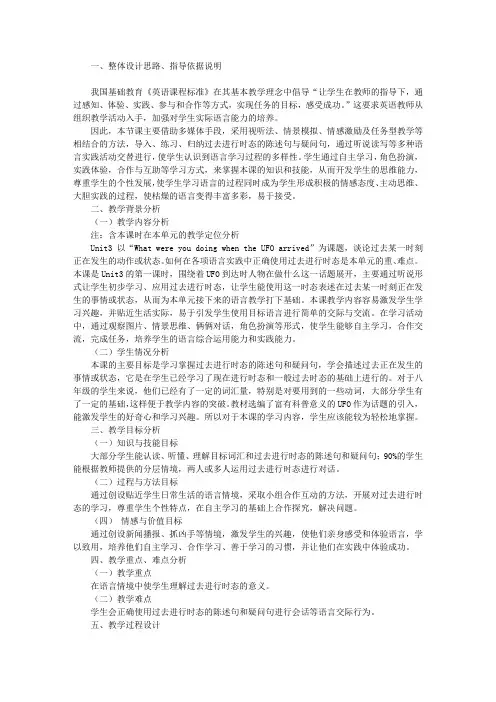
一、整体设计思路、指导依据说明我国基础教育《英语课程标准》在其基本教学理念中倡导“让学生在教师的指导下,通过感知、体验、实践、参与和合作等方式,实现任务的目标,感受成功。
”这要求英语教师从组织教学活动入手,加强对学生实际语言能力的培养。
因此,本节课主要借助多媒体手段,采用视听法、情景模拟、情感激励及任务型教学等相结合的方法,导入、练习、归纳过去进行时态的陈述句与疑问句,通过听说读写等多种语言实践活动交替进行,使学生认识到语言学习过程的多样性。
学生通过自主学习,角色扮演,实践体验,合作与互助等学习方式,来掌握本课的知识和技能,从而开发学生的思维能力,尊重学生的个性发展,使学生学习语言的过程同时成为学生形成积极的情感态度、主动思维、大胆实践的过程,使枯燥的语言变得丰富多彩,易于接受。
二、教学背景分析(一)教学内容分析注:含本课时在本单元的教学定位分析Unit3以“What were you doing when the UFO arrived”为课题,谈论过去某一时刻正在发生的动作或状态。
如何在各项语言实践中正确使用过去进行时态是本单元的重、难点。
本课是Unit3的第一课时,围绕着UFO到达时人物在做什么这一话题展开,主要通过听说形式让学生初步学习、应用过去进行时态,让学生能使用这一时态表述在过去某一时刻正在发生的事情或状态,从而为本单元接下来的语言教学打下基础。
本课教学内容容易激发学生学习兴趣,并贴近生活实际,易于引发学生使用目标语言进行简单的交际与交流。
在学习活动中,通过观察图片、情景思维、俩俩对话,角色扮演等形式,使学生能够自主学习,合作交流,完成任务,培养学生的语言综合运用能力和实践能力。
(二)学生情况分析本课的主要目标是学习掌握过去进行时态的陈述句和疑问句,学会描述过去正在发生的事情或状态,它是在学生已经学习了现在进行时态和一般过去时态的基础上进行的。
对于八年级的学生来说,他们已经有了一定的词汇量,特别是对要用到的一些动词,大部分学生有了一定的基础,这样便于教学内容的突破。
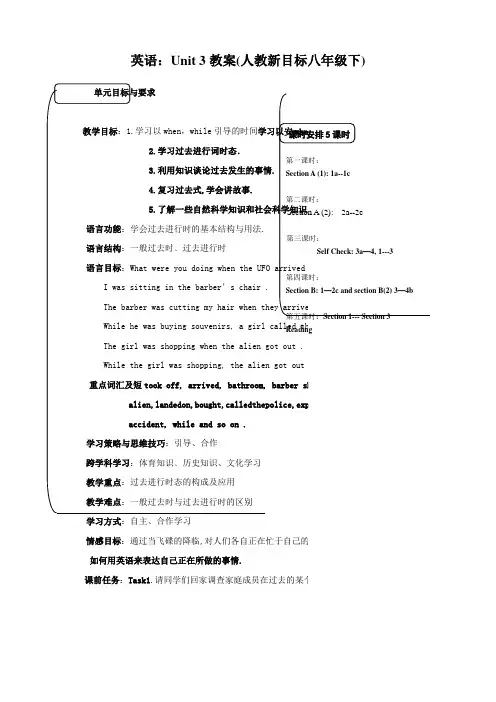
英语:Unit 3教案(人教新目标八年级下)学习方式:自主、合作学习情感目标:通过当飞碟的降临,对人们各自正在忙于自己的事如何用英语来表达自己正在所做的事情.课前任务:Task1.请同学们回家调查家庭成员在过去的某个时第一课时教学内容与分析教学内容:Section A (1): 1a---1c教学目标:1.能够掌握基本单词和词汇。
2.学会过去进行时的基本结构与用法。
3.能够运用以when 引导的时间状语从句。
4.能够运用基本句型进行提问。
学习任务:我的爱好目的:通过学生小组活动,调查在过去的不同时间里做不同的事情,学会使用过去进行时态,培养学生应用英语进行交际的能力。
语言技能:Listening .Speaking .Reading ﹑Writing语言知识:过去进行时的用法及复习一般过去时态提示词语及句型:got out, cut, barber shop, bathroom, kitchen, well, bathroomWhat were you doing when the UFO arrived ?I was sitting in the barber’s chair .The barber was cuttingmyhair when they arrived .教学重点、难点分析:教学重点:基本单词,词汇和句型教学难点:能够运用过去进行时谈论人们所做的事情.课前准备1.本课时的教学课件2.课前发给学生表格向学生布置任务:在表格中写出有关内容。
教学设计教学步骤建议和说明Teaching Steps :Step 1 :Warm-up and revision1.Share an English song .2.Greetings and free-talk .从平常的谈话中轻松导入本课句型,信息沟通使谈话非常真实,而又浅显What are you doing ? What did you do last night ?3.Show slides: Revise: is/an/are +动词ing4.Brain storm:Collect the names of activities which said by the students.Step 2 :Presentation :1.Watch a video2.By asking: What’s this in English ?Have you even seen it ?3.Teach:UFO, bedroom, bathroom, bedroom, kitchen,living-room, barber shopStep 3 :Work on:SB Page 18 , 1a .1.Point to the sentences .Read the sentences .Explain what each one means.2.Teach :barber shop, well, bathroom, bedroom, kitchen, get out, cut3.Look at the picture.. Point out the six people. Match the statements with the people in the picture4.Check the answers .5.Practice reading .Step 4 :Work on:SB Page 18 , 1b .1. Read the instructions .Make sure the Ss understand whatthey should do .2. Look at the dialogue in the picture .Explain :过去进行时态的构成: was / were + doing .用法:表示过去某一时刻或某一段时间正在进行的动作,一般用时间状语来表示。
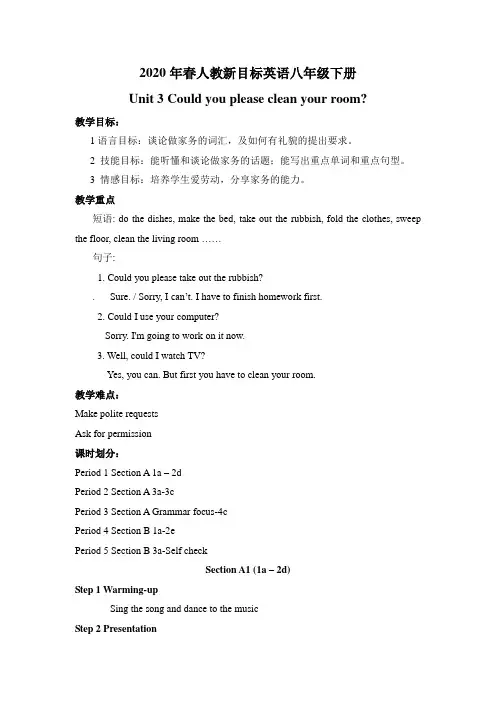
2020年春人教新目标英语八年级下册Unit 3 Could you please clean your room?教学目标:1语言目标:谈论做家务的词汇,及如何有礼貌的提出要求。
2 技能目标:能听懂和谈论做家务的话题;能写出重点单词和重点句型。
3 情感目标:培养学生爱劳动,分享家务的能力。
教学重点短语: do the dishes, make the bed, take out the rubbish, fold the clothes, sweep the floor, clean the living room ……句子:1. Could you please take out the rubbish?. Sure. / Sorry, I can’t. I have to finish homework first.2. Could I use your computer?Sorry. I'm going to work on it now.3. Well, could I watch TV?Yes, you can. But first you have to clean your room.教学难点:Make polite requestsAsk for permission课时划分:Period 1 Section A 1a – 2dPeriod 2 Section A 3a-3cPeriod 3 Section A Grammar focus-4cPeriod 4 Section B 1a-2ePeriod 5 Section B 3a-Self checkSection A1 (1a – 2d)Step 1 Warming-upSing the song and dance to the musicStep 2 Presentation1. W atch the photos and talk about them “W hat does he do every day?’ and learnthese phrases: do chores, do the dishes, make the bed, take out the rubbish, fold the clothes, do the laundry, clean the living room.2. Look these phrases and practice the conversation: Could you please take outthe rubbish? Sure. / Sorry, I can’t. I have to finish homework first.3. 1a Do you do these chores at home? Discuss them with your partner.Step 3 Listening1b Listen. Who will do these chores? Check (√) Peter’s mother or Peter.Step 4 Practice1c Make conversations about the chores in 1a.Make conversations.ExamplesA: Could you please...?B: Yes, sure. /All right. /No problem./Certainly.Sorry, I can't. I have to do...Sorry, I can't. I am doing...Step 5 Listening 2a&2bPeter asks his father if he can do four things. What does his father say? Check (√) “yes” or “no”. Listen again. Draw lines to the reasons.Step 6 Practice2c Make conversations using the information in 2a and 2bA: Could I use your computer?B: Sorry. I’m going to work on it now.A: Well, could I watch TV?B: Yes, you can. But first you have to clean your room?2d Role –play the conversationStep 7 Language points and summary1. Tony, could you please help out with a few things?help out 动词短语,表示在某人繁忙或遇到困难时“给予帮助”。
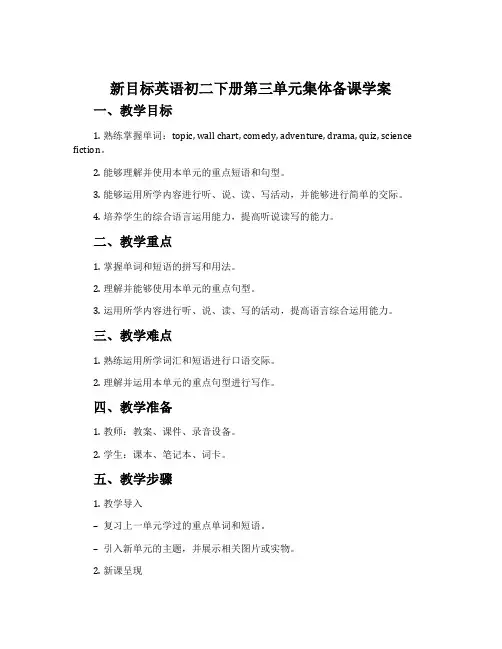
新目标英语初二下册第三单元集体备课学案一、教学目标1.熟练掌握单词:topic, wall chart, comedy, adventure, drama, quiz, science fiction。
2.能够理解并使用本单元的重点短语和句型。
3.能够运用所学内容进行听、说、读、写活动,并能够进行简单的交际。
4.培养学生的综合语言运用能力,提高听说读写的能力。
二、教学重点1.掌握单词和短语的拼写和用法。
2.理解并能够使用本单元的重点句型。
3.运用所学内容进行听、说、读、写的活动,提高语言综合运用能力。
三、教学难点1.熟练运用所学词汇和短语进行口语交际。
2.理解并运用本单元的重点句型进行写作。
四、教学准备1.教师:教案、课件、录音设备。
2.学生:课本、笔记本、词卡。
五、教学步骤1.教学导入–复习上一单元学过的重点单词和短语。
–引入新单元的主题,并展示相关图片或实物。
2.新课呈现–呈现新单元的核心词汇及其拼写和用法。
–使用图片或实物引导学生理解词汇的意义。
–呈现新单元的重点短语和句型,并进行示范和操练。
3.听力训练–播放录音,让学生听懂并记录关键信息。
–进行听力练习,培养学生的听力理解能力。
–练习听力题型,提高学生的答题技巧。
4.口语练习–进行情景对话,让学生运用所学短语和句型进行口语交际。
–分组进行角色扮演,提高学生的口语表达能力。
–进行口语活动,如小组讨论、辩论等,培养学生的团队合作和表达能力。
5.阅读训练–呈现阅读材料,让学生快速浏览并获取关键信息。
–进行阅读训练,培养学生的阅读理解和思维能力。
–练习阅读题型,提高学生的答题技巧和阅读速度。
6.写作训练–引导学生进行写作练习,如写一篇关于自己喜欢的电影的短文。
–检查学生的写作内容,帮助他们改正错误并提出建议。
–鼓励学生互相交流和分享写作成果。
7.总结与反思–对本节课所学内容进行总结回顾。
–让学生进行自我评价和反思,提出对今后学习的期望和计划。
六、教学延伸•布置相关的作业,如课后习题或写作任务。
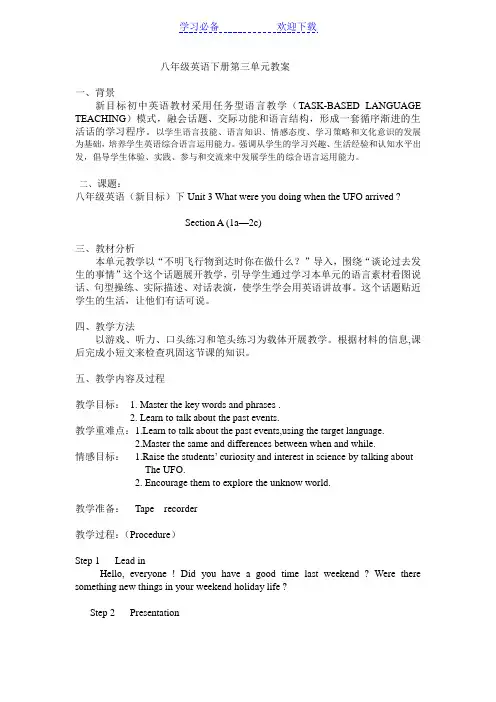
八年级英语下册第三单元教案一、背景新目标初中英语教材采用任务型语言教学(TASK-BASED LANGUAGE TEACHING)模式,融会话题、交际功能和语言结构,形成一套循序渐进的生活话的学习程序。
以学生语言技能、语言知识、情感态度、学习策略和文化意识的发展为基础,培养学生英语综合语言运用能力。
强调从学生的学习兴趣、生活经验和认知水平出发,倡导学生体验、实践、参与和交流来中发展学生的综合语言运用能力。
二、课题:八年级英语(新目标)下Unit 3 What were you doing when the UFO arrived ?Section A (1a—2c)三、教材分析本单元教学以“不明飞行物到达时你在做什么?”导入,围绕“谈论过去发生的事情”这个这个话题展开教学,引导学生通过学习本单元的语言素材看图说话、句型操练、实际描述、对话表演,使学生学会用英语讲故事。
这个话题贴近学生的生活,让他们有话可说。
四、教学方法以游戏、听力、口头练习和笔头练习为载体开展教学。
根据材料的信息,课后完成小短文来检查巩固这节课的知识。
五、教学内容及过程教学目标:1. Master the key words and phrases .2. Learn to talk about the past events.教学重难点:1.Learn to talk about the past events,using the target language.2.Master the same and differences between when and while.情感目标: 1.Raise the students’ curiosity and interest in science by talking about The UFO.2. Encourage them to explore the unknow world.教学准备:Tape recorder教学过程:(Procedure)Step 1 Lead inHello, everyone ! Did you have a good time last weekend ? Were there something new things in your weekend holiday life ?Step 2 Presentation1.Show the video again for the class , and teach new words:UFO (Unidentified Fly Object 不明飞行物飞碟)n.alien (外星人)n.land (登陆)v.2.Show out the statements of 2a3.Play the tape,listen and order these statements[1-5], then read thesentences.4.Now let’s see where alien was going .(Present new phrases and sentencestructures.)A: Where was the alien?(point to picture 1)B: It was in the bathroomA: Where was was the alien?(picture2)B: It was in the kitchen(lead student say other pictures, and at the same time wtite these new phrases on the blackboard ).Students finish 1a.Read these vocabulary after the teacher ,then students read together.[Can you ask and answer like me ?(point the big screem, let studentspractice above dialogues)]5. Later, I did a survey about where my friends were when the UFO arrived?1. cut hair (Lucy) in a barber shop2.Cook dinner(Kate) in the kitchen3. cut hair(Tom) in the barber’s chair4.Sleep (Jim) in the bedroom5. Talk on the phone (Allen) in front of library6. Take a shower(Tina) in the bathroomPresent (lead student say)A:Where was Lucy when the alian landed?B: She was in the barber’s shop when the alien landed.(practice other people as this)A: And what was Allen doing when the alien landed?B: He was talking on the phone in front of the library when the alien landed.(lead student say out others like this)Sum up: past progressive tense ( was/were + doing) 过去某一时刻或某一时段正在进行的动作。
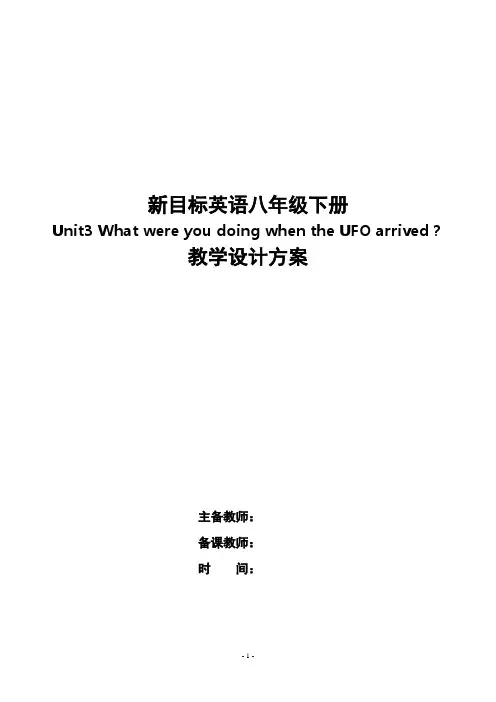
新目标英语八年级下册Unit3 What were you doing when the UFO arrived?教学设计方案主备教师:备课教师:时间:Unit3 What were you doing when the UFO arrived?教学设计方案一、单元教材分析:本单元的主要内容是"谈论过去发生的事情",语法重点是"过去进行时"。
Section A通过"谈论飞碟来时正在做的事",通过听力、对话练习、阅读等方式帮助学生掌握如何谈论过去发生的事(过去进行时和一般过去时);Section B通过听力、阅读、对话等方式,帮助学生掌握如何叙述过去发生的事情;Self Check部分通过填空和造句帮助学生复习所学词汇,通过根据材料写作练习讲述过去发生的事,通过分辨不同类的单词复习词汇;阅读部分帮助学生巩固一般过去时和过去进行时。
这一单元的重点在于"谈论过去发生的事情"。
二、预习目标:A知识与技能目标a. 能够认读单词,明确单词的意思:bathroom, bedroom, kitchen, UFO, alien, barber's chair cutting hair, climbing, jumping land, get out of, take off, in front of scaredb. 掌握以when引导的时间状语从句;重点句型:What were you doing when ...? I was doing sth. when ...用正确的方式描述课本中的图片。
B能力目标提高学生听、说、读、写综合运用知识的能力。
C情感态度与价值观发挥学生的潜能,回忆过去美好的时光,调动学生的积极性。
三、预习重点和难点:重点:以when为引导的时间状语从句难点:过去进行时与现在进行时的对比区别预习策略:以学生自学为主。
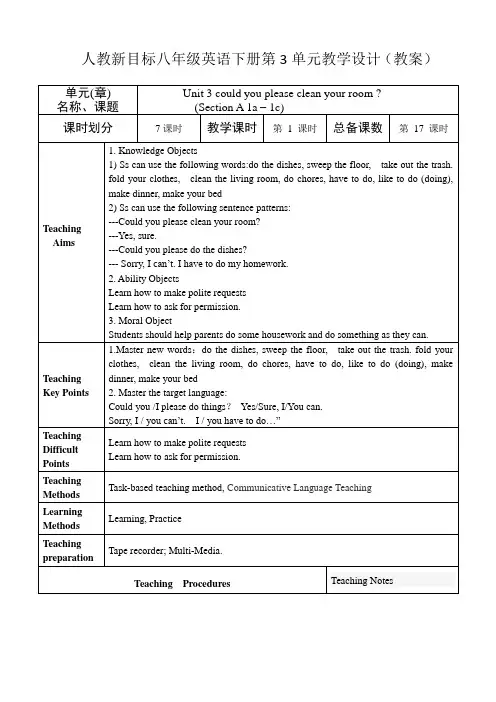
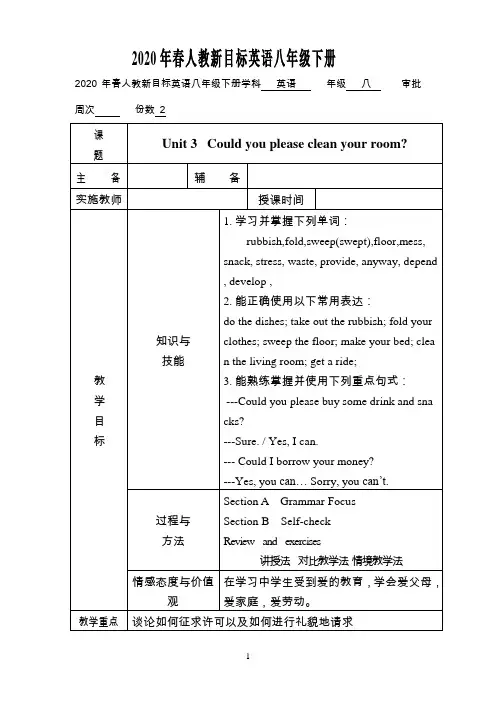
2020年春人教新目标英语八年级下册2020年春人教新目标英语八年级下册学科英语年级八审批周次份数2掌握并灵活运用本课的重点词汇rubbish fold sweep floor mess重点短语sweep the floor, work on, finish doing, take out the rubbish听懂“请求做家务活动”的相关话题及文章;学会有礼貌地提出请求和请求准许you!我认为两个小时的电视对你来说足够了!【观察】主谓一致One and a half hours is enough. 一个半小时足够了。
One of my favorite sports is basketball.我最喜欢的一项运动时篮球【小结】谓语动词与主语要在人称和数上保持一致。
Two months_____ a long holiday. 两个月是一个长假。
Twenty kilos ____so heavy. 2 0公斤并不太重。
People here ______ very friendly.这儿的人很友好。
2. Could you take out the rubbish, fold the clothes and do the dishes? 你倒垃圾、叠衣服和洗餐具好吗?rubbish垃圾;废弃物 (不可数名词)在英国英语中,rubbish最常用来表示丢弃的废物,但是在美国英语中trash更为常用,如:She threw the bottle into the trash (她把瓶子扔进了垃圾堆)。
3. And she won‟t be happy if she sees this mess. 如果她看到乱成这样,她会不高兴的。
mess/mes /noun 肮脏;杂乱;不整洁The room was in a mess. 这个房间杂乱不堪。
“What a mess !” she said after the party. 聚会后她说:“真是一片狼藉!”Linda can't stand _____. 琳达无法忍受脏乱。
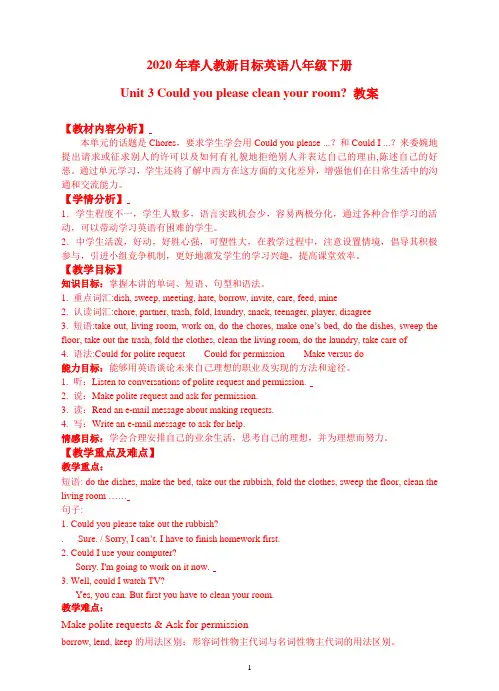
2020年春人教新目标英语八年级下册Unit 3 Could you please clean your room? 教案本单元的话题是Chores,要求学生学会用Could you please ...?和Could I ...?来委婉地提出请求或征求别人的许可以及如何有礼貌地拒绝别人并表达自己的理由,陈述自己的好恶。
通过单元学习,学生还将了解中西方在这方面的文化差异,增强他们在日常生活中的沟1.学生程度不一,学生人数多,语言实践机会少,容易两极分化,通过各种合作学习的活动,可以带动学习英语有困难的学生。
2.中学生活泼,好动,好胜心强,可塑性大,在教学过程中,注意设置情境,倡导其积极参与,引进小组竞争机制,更好地激发学生的学习兴趣,提高课堂效率。
【教学目标】知识目标:掌握本讲的单词、短语、句型和语法。
1. 重点词汇:dish, sweep, meeting, hate, borrow, invite, care, feed, mine2. 认读词汇:chore, partner, trash, fold, laundry, snack, teenager, player, disagree3. 短语:take out, living room, work on, do the chores, make one’s bed, do the dishes, sweep the floor, take out the trash, fold the clothes, clean the living room, do the laundry, take care of4. 语法:Could for polite request Could for permission Make versus do能力目标:能够用英语谈论未来自己理想的职业及实现的方法和途径。
1. 听:2. 说:Make polite request and ask for permission.3. 读:Read an e-mail message about making requests.4. 写:Write an e-mail message to ask for help.情感目标:学会合理安排自己的业余生活,思考自己的理想,并为理想而努力。
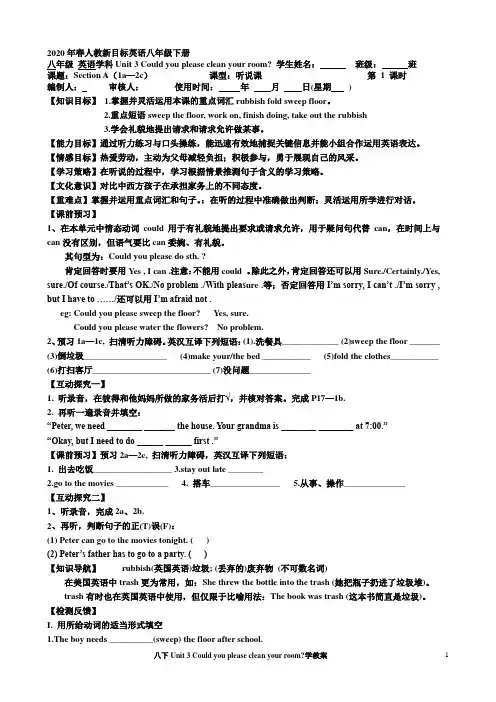
2020年春人教新目标英语八年级下册八年级英语学科Unit 3 Could you please clean your room? 学生姓名:班级:班课题:Section A(1a—2c)课型:听说课第 1 课时编制人:审核人:使用时间:年月日(星期)【知识目标】 1.掌握并灵活运用本课的重点词汇rubbish fold sweep floor。
2.重点短语sweep the floor, work on, finish doing, take out the rubbish3.学会礼貌地提出请求和请求允许做某事。
【能力目标】通过听力练习与口头操练,能迅速有效地捕捉关键信息并能小组合作运用英语表达。
【情感目标】热爱劳动,主动为父母减轻负担;积极参与,勇于展现自己的风采。
【学习策略】在听说的过程中,学习根据情景推测句子含义的学习策略。
【文化意识】对比中西方孩子在承担家务上的不同态度。
【重难点】掌握并运用重点词汇和句子。
:在听的过程中准确做出判断;灵活运用所学进行对话。
【课前预习】1、在本单元中情态动词could用于有礼貌地提出要求或请求允许,用于疑问句代替can,在时间上与can没有区别,但语气要比can委婉、有礼貌。
其句型为:Could you please do sth. ?肯定回答时要用Yes , I can .注意:不能用could 。
除此之外,肯定回答还可以用Sure./Certainly./Yes, sure./Of course./That’s OK./No problem ./With pleas ure .等;否定回答用I’m sorry, I can’t ./I’m sorry , but I have to ……/还可以用I’m afraid not .eg: Could you please sweep the floor? Y es, sure.Could you please water the flowers? No problem.2、预习1a—1c, 扫清听力障碍。
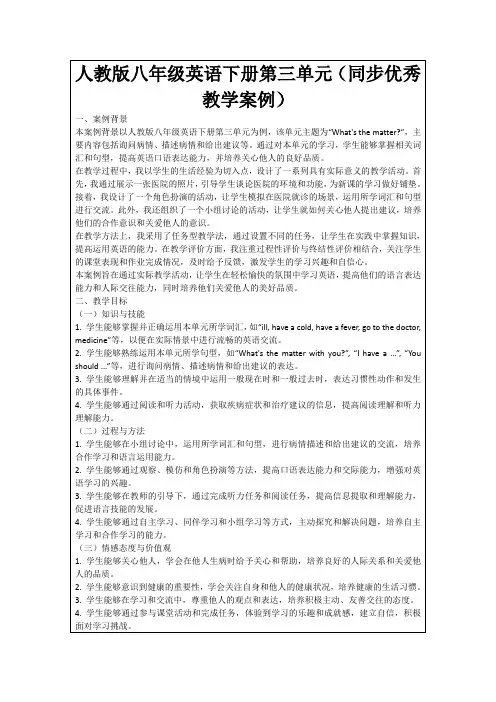
Unit 3Could you please clean your room?Period 1(Section A 1a-2d)1.mess【点拨】mess常作单数可数名词,意为“杂乱;不整洁”。
如:①The room was in a terrible mess.房间里杂乱不堪。
②The children made a mess in the living room.孩子们把起居室弄得很乱。
2.at least【点拨】at least为固定词组,意为“至少”,其反义短语为at most,意为“最多”。
如:①He will stay here for at least three weeks.他至少会在这儿待3周。
②Although he is poor, at least he is honest.尽管他穷,但至少他是诚实的。
3.a few【点拨】a few意为“几个;少数”,后面接可数名词复数。
如:①He asked me a few questions.他问了我几个问题。
②A few students are reading books in the library.几个学生正在图书馆里看书。
1.Peter, could you please take out the rubbish?彼得,你能把垃圾倒了吗?【点拨】Could you please do sth.?请你(做)……好吗?用于提出请求,希望得到对方的肯定回教学目标要求学生学会如何有礼貌地提出要求和请求准许重点词汇rubbish, take out the rubbish, fold, sweep, floor, mess重点句型①Could you please take out the rubbish?②Could you please help out with a few things?③Could I at least finish watching this show?④And she won't be happy if she sees this mess.⑤But the house is already pretty clean and tidy!答,说话的语气比较客气委婉。
Unit 3 Could you please clean your room?Section A 2a-2dTeaching Plan for “Could you please clean your room?”Section A 2a-2dI.Teaching Material AnalysisIn this period, students should know how to ask for permission. And after doing some listening practice, students should be given opportunity to practice a longer conversation using the target language.II.Students AnalysisStudents have learnt some Modal verbs such as can, may, should. And it’s good for them do know the use of “could”. However, they always do nothing at home but their parents do everything for them. So it’s important to teach them to make polite requests and ask for permission politely.III.Demands from English Curriculum StandardsAccording to English Curriculum Standards, English teaching should help students to develop for their whole life. Students are the hope of the future and they are under the task to make the world improved. So knowing how to make polite requests and ask for permission politely is important for the students. And know how to do something good for our society is also important for them.IV.Teaching objectives1.Knowledge objective:Students will be able to tell the meanings of important phrases including help out with sth., at least, take out the rubbish, fold the clothes, do the dishes, etc.2. Ability objectives: Students will be able to①know how to solve some problems with their partners.② make new conversations with the target language.3. Moral objectives: Students will able to①love and do something good for our society.② develop a sense of groupwork.V.Special teaching and learning methodsTask-based method; self-dependent and cooperative learningVI. Teaching proceduresSteps Activities PurposeStep 1: Lead-inThe teacher talks with the studentsabout the hobbies. And ask them toplay with me.To lead in the targ et language “Couldyou please do sth…”Step 2: Listening practice1. Languages learningThe teacher talks about somethingabout the hobby and includes the fournew phrases.To let Ss know the four phrases, andit will be easy for them to listen.2.Speaking practiceThe teacher makes a conversationwith the Ss with the sentences ”Couldyou please …” And the Ss will answer“Yes, I can.” Or “No, I have to …”To let Ss know how to make thecorrect answers, and it will be easy forthem to listen.3.ListeningListen to the tape for 3 times.Listen for the 1st time to finish 2aListen for the 2nd time to finish 2bListen for the 3rd time to follow4. Read the tapescript of 2aThe teacher asks several pairs ofstudents to read the conversation.To correct the answers andpronunciation.Step 3: Conversation learning1.Fast readingAnswer 2 questionsa.How many hours does Tony watchTV? -Twob.When will mother be back? –Anyminute now.To help students know the main ideaof 2d2.Listen and fill in the blanks To correct the answers andpronunciation.3.Careful reading and groupworkThe teacher would divide thestudents into 2 teams. And each teamhas different questions.To provide Ss a chance to work intheir groups and discuss with theirpartners.4.Show timeThe teacher will find some studentsTo correct the pronunciation and tryto have a good memory andto read the conversation for others. Ifthey can remember it, that will bebetter.cooperation.Step4: PairworkShow the students a piece of videoabout “Funny Twins”. And ask thestudents to guess what they are talkingabout? Then make a conversation ashumorous(幽默、搞笑) as they can.Teach the students to master theknowledge in a humorous way. Theywill remember the knowledge better.Step 5: Writing practiceShow Lei Feng’s picture in PPT. Andask the students, “ Could you pleasemake a poster and find some volunteersfor “Lei Feng Month”?”March is also called “Lei FengMonth”. It means we should do somegood things for our society. And as ateenager, we should love our countryand do something good for our country.Step 6: HomeworkIf there are some groups that haven’tfinish the posters in class, they willhave them as homework.Thanks! Have a good day。
Unit 3 Could you please clean your room? Period 1 Section A 1a-2d【导学目标】1.Master the key words and sentences:(1) Key words:rubbish, fold, sweep, floor, mess(2)Sentences:Could you please clean the floor?Can I use your computer?I think 2 hours of TV is enough for you!She won’t be happy if she sees this mess.2.Learn to talk about abilities.Ⅱ. Teaching Key Points and Difficult Points1.Master the key words and expressions.2.Master the use of structure “Could...?”.【导学过程】Step1.Lead-in (3 minutes)Free talk:T:I usually wash clothes at home.What about you?What do you usually do at home? S:...T:Do you often help your parents do the dishes?S:...T:What do you often do to help your parents?S:...Step 2.Presentation: look and say (5 minutes)1. Show some pictures and teach the new words and sentences.2.Let the students read the new words and remember them.3.Have a chant to consolidate the new words.Step 3.Activity 1a(5 minutes)1.Have students look at the pictures in Part 1a on the screen.Discuss the chores with partners.2.Ask the students to show their dialogues.3.Play a game:memory test. Ask students to speak out answers together.Step 4. Activity 1b (4 minutes)1.Have the students read the instructions and know how to do them.2.Play the tape for two times.The first time, ask students to listen carefully and write the answers.The second time,listen and check the answers.3.Follow the tape. Let students pay attention to the pronunciation and intonation. Step 5.Activity 1c (3 minutes)1.Give students enough time to practice the conversations about 1a.2.Ask them to make their own conversations. For example:A: Could you please sweep the floor ?B: Yes,sure. Can you do the dishes?C: Well, could you please do them? I’m going to clean the living room.D: No problem.Step 6.Activity 2a and 2b (5 minutes)1.Get the students have a quick look at the instructions of these two activities, so they can know how to do them.2.Play the recording the first time for the first time to get the main idea.3.Play it again for then to complete the sentences in 2b.4.Check the answers.5.Follow the tape.Step 7.Activity 2c (3 minutes)1.Work in pairs to talk about chores.2.Invite several pairs to act out their conversations.Step 8. Activity 2d (7 minutes)3.1.Role play the conversation and think about what others would like to say to you and try to make the conversations. Please begin with: Could you please …?2.Read after the tape,pay attention to the pronunciation and intonation.4.Ask students to make a report like this:Hello! I’m … In my group, … does the dishes and cleaning._______________________________________________________________________________ _______________________________________________________________________________ _____ .We think ... is the most able one at home.5.Explain some language points.Step 9. Summary (2 minutes)Let the students think about what we have learned in the period.Step 10. Exercises (8 minutes)Let the students finish the exercises to consolidate what we have learned today. 【探究归纳】1.Could you please take out the rubbish?take out 拿出来, 取出来He took a dictionary out. 他拿出来一本字典。
Unit3 Could you please clean your room?(第一课时)授课内容:Section A 1 (1a-2d) 课型:新授总第13课时教学目标:1.掌握1a-2d的词语2.学习提出礼貌的请求和请求允许;3.学会使用句型Could you please...?和Could I...?;教学重点掌握一些家务活动相关的动词短语。
掌握情态动词could的用法和助动词do的用法教学难点掌握情态动词could的用法和助动词do的用法教学过程一、课前预习(教师寄语: No pains, no gains)认知前提:根据汉语意思完成句子1. My mother _________________________(做早饭)at 7 o’clock every day.2. We should __________________________(打扫房间)every day.3. I usually help my parents_______________________________(洗碗筷).4. Can you _______________________________(洗衣服)by yourself ?新知认知:Task1. 背诵课本17--18页单词,根据汉语意思进行默写垃圾___________ 折叠_________ 打扫________(过去式)______地板______________ 杂乱,不整洁________Task 2. 预习课本17--18页(1a--2c)的内容,找出下列短语。
洗碗碟________________ 倒垃圾__________________ 叠衣服_________________扫地______________ 整理床铺______________ 打扫客厅_____________________没问题______________ 外出吃完饭_____________ 去看电影__________________在外面待到很晚______________ 骑车_____________ 做一些工作______________ Task 3. 预习课本18页2d对话,翻译下列句子。
新目标英语八年级下册第三单元教案新目标英语八年级下册第三单元教案Unit3WhatwereyoudoingwhentheUFOarrived?一、知识点拨I.Language Goals·学会过去进行时的基本结构与用法·学会简单描述过去发生的事情·学会讲简单的故事II.Key Words1.cut v.切;剪;割Be careful.Don’t cut yourself.小心,别切到自己。
2.alien n.外星人Nobody knows whether there are aliens or not.没人知道到底有没有外星人。
3.land v.登岸;登陆;降落The plane will land in ten minutes.飞机将在十分钟后降落。
4.while conj.当……的时候;在……之时While I danced, she sang.我跳舞,她唱歌。
5.right adv.正好;恰好The accident happened right over there.事故正好发生在那里。
6.surprised adj.惊奇的;吃惊的I was surprised that he was late for the party.我很惊讶他聚会居然迟到了。
7.kid v.欺骗;哄骗I’m not kidding you.我没有骗你。
8.anywhere adv.到处;无论哪里(用于否定句中)Did you go anywhere yesterday? 你昨天去没去过什么地方?9.happen v.发生A funny thing happened in the subway yesterday.昨天地铁里发生了一件有趣的事。
happen to +名词发生于……身上She hoped nothing bad would happen to him.她希望不会有坏事发生在他身上。
八年级295/306班英语科备课教师备课时间2019.3.10
【单元内容】Unit 3 Could you please clean your room?
【课标要求】
1.能听懂有关日常家务活的短语;能听懂用could表达礼貌请求和委婉获取许可;能听懂对其他日常活动的提问和回答。
2.会说出表达家务活的短语;能用could提出礼貌的请求和委婉的许可,并会说相应答语。
3.正确读出本单元所学内容,正确表达自己和他人的生活习惯。
4.运用could表达礼貌请求和回答;会用make与do。
【学习内容分析】(分析知识点在知识体系中的地位和作用;分析知识的应用价值;分析知识对学生的情感熏陶及能力、思维培养上的作用)
本单元围绕“家务和请求许可”开展教学活动,学习如何用情态动词could礼貌地提出请求,如何礼貌地请求允许自己做某事,并做出得体的回答,学习如何写留言条以及请求他人的帮助。
Section A主要谈论一些与家务有关的短语,如do the dishes, fold the clothes等等,并引出Could you please/Could I please...?句型。
Grammar Focus主要总结了“请求许可和要求”的Could you/I please...?用法。
Section B主要是通过进一步熟悉有关日常生活、社交礼仪等方面的话题,巩固could表示请求许可和要求的用法,并加强学生的家庭责任意识教育。
【学情分析】(分析知识生成点及新旧知识的关联,预设学生学习困难)本单元话题来自学生的生活经历,学生在七年级已经学习了许多动词短语,为表达提供了语言基础。
此外,学生已初步掌握了用祈使句和Could you/I...?提出请求和建议,为本单元学习打下了基础。
活动的话题又是学生较感兴趣的内容,为表达提供了真实的材料,使得学生在各个活动中想说、有话说,使活动参与的范围广,达到任务的真实性,有效性。
在学习中学生受到爱的教育,学会如何与人交往,学会表达自己对事情的看法,使他们的个性得到张扬。
【学习目标】(符合课标、教材内容、学情;陈述具体、可测;体现过程与方法)
1.能够熟练掌握并学会运用本单元的重点词汇、短语及句型。
2.掌握could表示请求的用法。
3.能够运用教材中的听力材料对学生进行听力训练。
4.通过教材中的阅读材料对学生进行阅读能力、写作能力等的训练和提高。
【重难点】
重点:
1.掌握表示家务的短语。
如do the dishes,take out the rubbish,fold the clothes等等。
2.掌握情态动词could开头表请求的用法及其回答。
3.增强学生的家庭责任意识。
难点:
1.掌握could的用法。
2.增强学生的家庭责任意识。
3.能够掌握并运用听力的一些技巧和方法。
4.提高阅读及写作能力。
八年级295/306班英语科备课教师备课时间2019.3.10
【主干问题及突破策略】(问题化、系列化、层次化、整体化,并设计突破策略)主干问题1:Could you please...?与Could I...?用法的区别是什么?突破策略:
先结合汉语了解两种句型的不同Could you please...?表示有礼貌的请求,而Could I...?表示请求许可;再通过练习了解它们在回答方面的异同;在不断练习中加以巩固。
主干问题2:Could you please...?的回答有哪些?
突破策略:
结合不同的语境进行发现和总结:Yes, I can./Sure, I can./Sure./Of course./Certainly./OK./All right./
With pleasure. 否定:Sorry, I can’t./I’m afraid I can’t. (注意不能用could来回答)。
主干问题3:如何写留言条?
突破策略:
留言条格式:1.开头要有称呼。
2.日期部分可以写在便条的右上角。
3.便条的内容要简洁明了。
可以用上本单元的目标语言Could you please...? 4.结尾要有署名,在正文的右下角。
主干问题4:make与do用法的不同?
突破策略:
结合所学的相关短语make breakfast, make the bed, do the dishes, do homework...总结两个单词作“做”时的区别:make是做具体的东西;do是做一件抽象的事情。
主干问题4:Neither did I此类倒装句型的用法是什么?
突破策略:
复习前面所学的So do I.句型进行学习:1.表示“两者都不”。
2.Neither+动词(be/情态/助动)+主语。
3.Neither...nor...(既不...也不,就近原则)。
4.Neither of...(谓语动词用单数)
【课时教学内容安排】
Period 1: Section A 1a-2d 第一课时 Period 2: Section A 3a-3c 第二课时 Period 3: Section A Grammar Focus-4c 第三课时 Period 4: Section B 1a-2e 第四课时 Period 5: Section B 3a-Self Check 第五课时
【单元知识思维导图】。